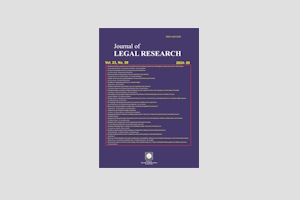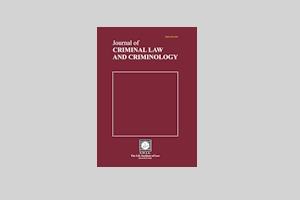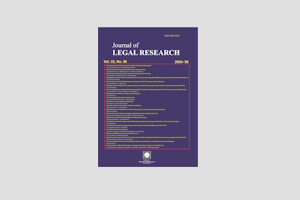Journal of
LEGAL RESEARCH
Number 39
Vol. XVIII ● No. 3
Autumn 2019
Managing Editor: Vahid Eshtiagh
Editor-in-Chief: Seyyed Ghasem Zamani
CONTENTS
Articles
International Criminal Tribunal Approach to Forced Marriage as Sexual Violence
Dr. Ahmadreza Tohidi & Azadeh Dadashi
Renegotiation; Reflection of the Need to Maintain the Economic and Financial Equilibrium of Upstream Petroleum Contracts
Dr. Mohammad Namdar Zangeneh & Dr. Seyyed Hossein Tabatabaei
Civil Liability of Natural Persons Resulting from Transmission of Contagious Diseases with Emphasis on British Law
Dr. Alireza Rajabzadeh & Bahareh Shafiei
A Comparative Study of Abandoned Ship Ownership and Its Rules in the Maritime Law System of Iran, US, UK and France
Seyyed Abbas Motevalli & Dr. Mahmoud Qayyumzadeh & Dr. Seyyed Morteza Naeimy
The Causes and the Uses of Non-Criminal Responses instead of Answering Criminal (Punishment) of the Penal Code, Adopted in 1392
Dr. Ramin Alizadeh & Dr. Mohammad Ali Jahed
Prevention and Compensation Methods in Violation of Intellectual Property Rights (In Iranian Law and International Documents)
Sakineh Dehghan
A Comparative Study of Foreign Participation in Commercial Companies of Free Zones
Elham Meghraziasl
The Nature of Impossible Offence in Iran’s Law with Respect to English Law
Dr. Abolhasan Shakeri & Dr. Mahmoud Darvish Torabi
ASEAN Dispute Settlement Mechanisms; A Model for the Economic Cooperation Organization (ECO)
Mohammad Reza Narimani Zamanabadi
Koyban as a Prosecutor in the Zorastrinian Law
Aziz Nokandeh
Prevention of Victimization of Judiciary’s Staff in Iran: Case Study of Broujerd City
Dr. Javad Riahi & Dr. Esmaeil Sharifi & Azin Rouhani
International Commercial Words a Mistaken Equivalent Used in Farsi ITL Literature for “INCOTERMS”
Seyyed Aziz Masoumi
Identifying and Preventing Opportunities for Organized Crime in the International Antiquities Market
Author: Dr. Simon Mackenzie, Translator: Bahareh Ghanoon
Articles
International Criminal Tribunal Approach to Forced Marriage as Sexual Violence
Dr. Ahmadreza Tohidi
Assistant Professor, Department of International Law, Faculty of Law, University of Qom, Qom, Iran
&
Azadeh Dadashi
Master of International Law, Faculty of Law, University of Qom, Qom, Iran
Email: dadashi.il68@yahoo.com
Abstract:
Sometimes, in national or international armed conflicts, heinous and violent acts against civilians, especially women and children, including massacre, repeated rape of family members, beheadings, abduction of human organs, as well as forced marriage (The offense may include rape, slavery, forced pregnancy and forced labor) have been reported, but the formulation of international human rights, sex offenses or gender-based offenses has been reported as international offenses, so that perpetrators and hostages can be prosecuted. This paper presents a descriptive and Accordingly, following the delineation and expression of the constituent elements of the crime, we will study the type of international tribunals established after World War II because we believe that forced marriage is an insult to the religious and social standing of the institution of marriage and family and causes psychological harm; There is a strong mentality to women and to the development of fundamental rights and their process of development in society that needs to be further addressed in the field of judicial and criminal justice.
Keywords: Forced Marriage, Sexual Violence, International Criminal Tribunals, International Crimes.
Renegotiation; Reflection of the Need to Maintain the Economic and Financial Equilibrium of Upstream Petroleum Contracts
Dr. Mohammad Namdar Zangeneh
Ph.D. Centre for Energy, Petroleum and Mineral Law and Policy, University of Dundee, United Kingdom
&
Dr. Seyyed Hossein Tabatabaei
Assistant Professor, International Law Department, Law Faculty, Tarbiat Modares University, ares.ac.irTehran, Iran
Abstract:
Assuming that the rules formulated for short-term contracts will not be suitable for the needs of relationships that should continue over a period of time, it has been accepted both in domestic law and international law that an international investment contract, particularly upstream petroleum contracts, may be influenced by change in circumstances. People are supposed to bear the losses arising from unexpected situations in short-term, but that is not always the case in long-term relationships. Significant changes could occur in the economic and social conditions surrounding foreign investment contracts. Petroleum contracts, in particular, are negotiated under complex and uncertain circumstances. Therefore, the parties’ foreseeability to predict all the contingencies is limited and every possible eventuality in contract cannot be specified in advance. Under these circumstances, one option is for the parties to accept reasonable requests for renegotiation by their partner when the contractual or financial equilibrium has been severely disrupted by external events.
Keywords: Renegotiation, Upstream Petroleum Contracts, Change of Circumstances, Contractual Stability, Sovereignty of States, Protection of Foreign Investment.
Civil Liability of Natural Persons Resulting from Transmission of Contagious Diseases with Emphasis on British Law
Dr. Alireza Rajabzadeh
Faculty Member of Raja University, Qazvin, Iran
&
Bahareh Shafiei
Ph.D. Student of Private Law, Islamic Azad University South Tehran Branch, Tehran, Iran
Abstract:
Nowadays, the human society is facing big challenges as a result of development of serious contagious diseases, such as Ebola, various kinds of Hepatitis, HIV and … and it has created civil liability problems. Civil liability is one of the most important issues in private law, which is considered sanction of individual rights. This paper deals with civil liability of natural persons resulting from transmission of serious contagious diseases and liability of each of them so as to prevent from violation of the rights of victims suffering from such severe contagious diseases. For instance, if a hairdresser causes disease transmission to a healthy person due to his/ her imprudence, it indicates an element of his/ her liability. Also, if a mother refrains from pre-pregnancy vaccination and needed tests and thus causes disease transmission to her baby, it is indicative of an element of her liability. On the other hand, liability arising from contagious disease is not particular to patients who are aware of their disease, but also involves unknowing patients and the liability of unaware patients can be proven by destruction and causation rules.
Keywords: Civil Liability, Tort, Contagious Disease, British Law, AIDS, Loss, Indirect Causation.
A Comparative Study of Abandoned Ship Ownership and Its Rules in the Maritime Law System of Iran, US, UK and France
Seyyed Abbas Motevalli
Ph.D. Student of Law, Islamic Azad University of Saveh, Markazi, Iran
&
Dr. Mahmoud Qayyumzadeh
Professor of Islamic Azad University of Saveh, Markazi, Iran
&
Dr. Seyyed Morteza Naeimy
Assistant Professor of Islamic Azad University, Bandar Anzali Branch, Gilan, Iran
Abstract:
In most coastal countries, including Iran, there are mud, damaged, semi-submerged, and sunken ships whose owners do not take action to determine their destination. Iranian maritime law and existing bilateral or multilateral treaties provide a clear solution. On the one hand, the survival of ownership complicates its effects on the legal system to solve the problem.
There is no explicit reference in international documents, particularly to the conventions of Parliament called “Preventing Marine Pollution Resulting from Waste Disposal”, “Carcass Transfer” and “Maritime Liability Disclaimer”, which assumes that the owner or owners of the ship will be deferred Ownership dominance has a norm.
In this research, by violating the jurisprudential principles and rules due to the silence of the relevant law and sometimes by applying the laws of other major maritime states, the domination and ownership interests of these vessels have been discontinued following the strategic policy of the port and maritime and conservation organizations. The environment and the international customary rules in the jurisdiction are subject to the disputable property of the religious ruler.
Keywords: Ownership, Abandoned Ship, Abandoned, Derelict, Customs Waste, Time Lapse.
The Causes and the Uses of Non-Criminal Responses instead of Answering Criminal (Punishment) of the Penal Code, Adopted in 1392
Dr. Ramin Alizadeh
Ph.D. in Criminal Law & Criminology, University Lecturer, Department of Law, Islamic Azad University, Ardabil Branch, Ardabil, Iran
&
Dr. Mohammad Ali Jahed
Ph.D. in Criminal Law & Criminology, Faculty Member, Department of Law, Islamic Azad University, Ardabil Branch, Ardabil, Iran
Abstract:
So that the judicial authorities should also crime and punishment, the offender and character, financial position, and in this regard special attention to the family or community punishment and in particular the call for non-criminal penalties alternative is paying special attention. The importance of this issue in paragraph 6 of Article 81 of the Law criminal prosecution 1958 France and Articles 40 to 95 of the penal code legislation was approved in 1392 is considered. This article is an attempt to establish the position of “non-criminal responses instead of answering criminal” has been done. If the decision is that the responses would be appropriate culture necessary measures to be carried out in the community and the courts.
Keywords: Punishment, Non-Criminal Responses, The Right to Not Punish, Rehabilitate, Punishment Restitution.
Prevention and Compensation Methods in Violation of Intellectual Property Rights (In Iranian Law and International Documents)
Sakineh Dehghan
M.A. in Private Law, Law faculty, Islamic Azad University Central Tehran Branch, Jurisconsult in Post Bank Iran, Iran
Abstract:
Different methods to compensate the losses are to fulfill the obligations of a criminal. Since there are various natures for types of losses and each of them has its own varieties, their compensations’ methods are not also the same. Due to the fundamental role of intellectual property rights in flourishing the scientific, social, economic and industrial development of communities, supporting of these types of properties is very important for right-holders and punishing the offenders especially in a way to ensure the effective implementation of the rights. This fact has caused to justify the preparation of performance guarantees and support special thoughts in inside and outside of the country, to control the violation actions, and to prevent from the further crimes that could cause wider infringement of intellectual property rights. Legal rights have legal enforcements. Civil sanctions are one of the most important law sanctions that will be discussed in the form of the dedicated and common modes of compensation in this study.
Keywords: Intellectual Property, Remedy, Losses, Violation, Sanction.
A Comparative Study of Foreign Participation in Commercial Companies of Free Zones
Elham Meghraziasl
Ph.D. Student in Private Law, Islamic Azad University, North Tehran Branch, Tehran, Iran
Abstract:
Sometimes countries due to the some interests, had to create a dual legal system in its territory, and separate some Areas of their territory from the mainland and expect more easier regulation for them. Although this dichotomy could be caused problems, but the benefits of it causing the country to ignore its flaws and enjoy the comparative advantages of it. One of the most important countries goals from the creation of such zones that are called generally “Free Zone” in this study, is Attracting both foreign and domestic investment .Since today commercial companies play an important role in trade and economy so vast investments occur in commercial companies form. Thus, the regulations governing the foreign participation in them that are the biggest investors in these areas are very important. This article has tried to explain the concept of free zones and establish goals. Then, study the legal status of foreign participation in commercial companies in the free zones according to available legal sources in the country and expressed differences with the mainland and with tailored compared with China and UAE free zones corresponding regulations and ultimately advantages of creating commercial companies in the free zones and barriers in the way of investors in this area are perused.
Keywords: Free Zones, Mainland, Commercial Companies, Foreign Investment, Foreign Participation.
The Nature of Impossible Offence in Iran’s Law with Respect to English Law
Dr. Abolhasan Shakeri
Associate Professor, Department of Criminal Law and Criminology, Faculty of Law and Political Sciences, University of Mazandaran, Mazandaran, Iran
&
Dr. Mahmoud Darvish Torabi
Assistant Professor, Department of Criminal Law and Criminology, Payame Noor University, Iran
Abstract:
Commitment of an act with the intent to commit an offence will not always result in a crime. Sometimes in performance stage, although with malice intention, some outer- will element the crime do not happen. In this case if the commitment is probable it will be attempting the crime and if it is impossible to commit, it is called attempting the impossible crime. In any way it is crime in English law, but under section 122 of the Islamic Punishment Act, if attempting to commit a specific offence is crime, then legal element of the impossible offence is formed. The guilty intention to commit a crime and the defendant’s mistake (unconsciousness) of the nature of means or issue is the guilty intention of impossible offence. Impossibility of commitment and offender’s positive conduct with direct relation to the offence that necessarily is the last conduct in attempts, is the physical element of this crime. In this case the acts done before last conduct is called attempting impossible offence that is not a crime. Involvement in an impossible offence will occur in four forms: perpetrator, causation, participation and accessory.
Keywords: Attempting the Crime, Impossible Offence, Causation, Participation, Offender, British Law.
ASEAN Dispute Settlement Mechanisms; A Model for the Economic Cooperation Organization (ECO)
Mohammad Reza Narimani Zamanabadi
Senior LL.B. Student, Faculty of Law, Shahid Beheshti University, Tehran, Iran
Abstract:
The Association of Southeast Asian Nations (“ASEAN”) is regarded as one of the most important economic-trade blocks around the world and one the few successful international organizations among the developing countries. A great deal of such success could be attributed to the integrated legal infrastructures which ASEAN benefits from; legal infrastructures which the members have designed and implemented on a step by step basis since the establishment of the organization. Among these, the multi-facet ASEAN system of dispute settlement is a cornerstone. This paper seeks to examine the applicability, competent authorities and the procedures of this system in deciding a broad range of disputes. Accordingly and by the way describing this part of the legal system of ASEAN, this paper is based on the belief that modeling the ASEAN dispute settlement mechanisms in similar international organizations among developing countries, specifically the Economic Cooperation Organization (ECO), can make a significant contribution as to improving the functioning of such organizations.
Keywords: ASEAN, Dispute Settlement, Arbitration, Legal Modeling, ECO.
Koyban as a Prosecutor in the Zorastrinian Law
Aziz Nokandeh
Ph.D. Student of Payame Noor University, Tehran, Iran Attorney at Law
Email: korushnokandyhhh@yahoo.com
Abstract:
One of the most important tasks of state sovereignty is maintaining public order. Society as injured because of disruption of public order, demanding prosecution and punishment of offenders respectively. Although the charges are dealt with in the legal system Zoroastrian kings system as a reference method and prosecute complaints have been received. But the author based on the evidence presented, after the kings, in the legal system, officials were responsible for crime detection and preliminary investigation and prevention of crime independent have been doing. The case has been sent to the court. Ban said cui this person. There were people under him were doing this activity. Ban cui including officials of the prosecutor’s duties is to be done today, Examined in this study. In addition to the fact that Iran compared with the criminal procedure code, the purpose was to show to what extent the implementation of the provisions of that era with today’s rules.
Keywords: Koyban, Prosecutors, Prevention, Preliminary Investigation, Zoroastrian Law.
Prevention of Victimization of Judiciary’s Staff in Iran: Case Study of Broujerd City
Dr. Javad Riahi
Assistant Prof. of University of Ayatollah Ozma Broujerdi, Lorestan, Iran
&
Dr. Esmaeil Sharifi
Assistant Prof. of University of Ayatollah Ozma Broujerdi, Lorestan, Iran
&
Azin Rouhani
Master in Criminal Law and Criminology from Broujerd Azad University, Lorestan, Iran
Abstract:
Since victim is one of the elements of many of crimes, nowadays, it is undoubtedly, necessary for a successful criminal policy to research about victims and their role in occurrence of crimes. In the meantime, victimization in judiciary is an area that has been less attended. The study of victimization in judiciary is important because, the judiciary has been established to encounter law-breaking, but, evidences indicate interesting amount of crime and victimization in judiciary itself. The present study, using technique of measurement and quantitative method and by means of questionnaire and all-counting method, has examined elements of victimization of judiciary’s staff in Broujerd city in 1394. Results indicate that an interesting number of judiciary’s staff in Broujerd city (30 percent fully and 22.5 percent more or less) have been victimized especially with regard to crime of insult. Also, the elements of nature of job, difficult conditions relative to job, specifications of clients (especially their ignorance), loss of enough and suitable equipment, specifications of location and weakness of protective measures and official control, have been an important role in victimization of judiciary’s staff.
Keywords: Judiciary, Staff, Victim, Victimization, Insult, Borujerd City.
International Commercial Words a Mistaken Equivalent Used in Farsi ITL Literature for “INCOTERMS”
Seyyed Aziz Masoumi
Official English Translator of the Judiciary Tehran; M.A. Student in International Trade Law, Faculty of Law, Islamic Azad University, Damghan Branch, Semnan, Iran
Abstract:
Farsi International Trade Law literature has traditionally translated INCOTERMS as “International Commercial Words”/ INCOWORDS. The why and how of this tradition has its root in the pathology of translation in Iran, namely the body controlling scientific translation has not been yet recognized or if recognized, could not reach to its predetermined end. Unfortunately, translation related problems are seen in the Iranian Law Texts extracted from foreign laws texts. International trade literature contains so many terms/ words, but the question is why ICC has a different look at these 11 TERMS and published many versions of INCOTERMS. TERM in English means “Word” & “Condition” and before translating, it should be cleared that if TERM in INCOTERMS means “Word”, “Condition” or both. It seems that TERM in INCOTERMS means “Word” and “Condition” as well. But the Farsi translated “International Commercial Words”/ INCOWORDS cannot transfer the meaning intended by ICC. This paper, based on some criteria of linguistics, translation and law, is aimed at establishing the fact that the Farsi equivalent used for INCOTERMS is not the right equivalent and the equivalent of “International Commercial Words”/ INCOWORDS does not cover the real intention of ICC “Conditions Abbreviations for Sale of Goods”. The Farsi writers could use at least the word “International Commercial Abbreviations”. Finally, some suggested Farsi equivalents are listed.
Keywords: Incoterms, Incoterms in Farsi, Incoterms in Persian, International Commercial Law, Sale of Goods.
Identifying and Preventing Opportunities for Organized Crime in the International Antiquities Market
Author:
Dr. Simon Mackenzie
Professor of Criminology, Victoria University of Wellington, Member of the Scottish Centre for Crime and Justice Research at the University of Glasgow, Scotland
&
Translator:
Bahareh Ghanoon
M.A. in Intellectual Property Law, Faculty of Law and Political Science, University of Tehran, Tehran, Iran
Abstract:
On December 2008, International Scientific and Professional Advisory Council of the United Nations (ISPAC), under a programme called “Crime Prevention and Criminal Justice Programme” held an international conference in Italy, titled “Organized Crime in Art and Antiquities”. 11 articles which were represented at the conference were later published by the council in a book with the same title, edited by Stefano Manacorda.
This article is one of those represented in the conference, which engages in explaining the subject and the forming elements of organized crimes in art and antiquities. It also has a critical review on the Dealing in Cultural Objects (Offences) Act 2003 of UK which was passed in order to prevent and punish such crimes. Referring to legislative and practical experiences of UK, which have long been studied by the author, and various approaches toward fighting the so-called crime which are mentioned in this article can be extremely useful to be appended in our country which is rich in antiquities and historical monuments.
Keywords: Criminal Protection of Cultural Products, International Organized Crime, Criminal Market, Theft of Cultural Products, Antiquities Crimes.





